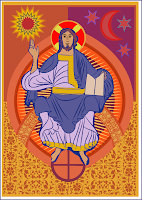Quite unexpectedly, I had an interesting dilemma surrounding the celebrations of All Saints and All Souls days this year. Still grieving over the death of my beloved friend four months ago, I found this annual call to pray for the dead somewhat conflicting... how could I pray for the repose of someone when I still have not fully accepted the fact of his unexpected death?
In this, as in all experiences, it is true that the journey of life and the state of our individual inner emotional landscape deeply affects how we experience the communal celebration of the liturgical year. As the year is marked by any given feast, we are never the same people we were the year before at this time. Nor will we be the same next year. We hear the Mass readings in the emotional space we are in - and we hear, through the power of the Holy Spirit, what God means for us to hear at this point on our journey.
Yes, I know this and I trust it to be true. So, all that I can do is walk through this November, still arguing with God over this loss, and know that next year I will be in a different space. The experience of this portion of the litugical year this time next year will be unique to where I am in the process of letting go of my beloved dead.
At Mass, we should never forget that the Assembly is not simply a corporate entity, but individuals, each with a unique story they bring with them. Among the gathered are many in the midst of their own struggles with faith and life issues. Anything we read, say or sing resonates with each individual according to their state of life. While we are, for that hour, One Body, we are many hearts, each listening to the Spirit in his or her own way. Each called to offer their struggles, with the bread and wine, to be transformed.
Requiem æternam dona eis, Domine; et lux perpetua luceat eis cum Sanctis tuis in aeternum, quia pius es. Amen.
 Unlike the traditional New Years image of the creaky old man representing the old year and the newborn baby the new, our old year Jesus is the enthroned, powerful ruler to whom is due all glory, honor and dominion. Because Christ dwells in eternity, he is forever at the peak of his mature strength, not vitiated by age.
Unlike the traditional New Years image of the creaky old man representing the old year and the newborn baby the new, our old year Jesus is the enthroned, powerful ruler to whom is due all glory, honor and dominion. Because Christ dwells in eternity, he is forever at the peak of his mature strength, not vitiated by age.  As a matter of fact, Christ the Baby is not the mute, powerless infant for more than a passing moment - the short duration of the Christmas Season, because the Baby, too, lives in eternity - the already-not-yet of time. We should not make the mistake of seeing only his helplessness and tinyness. He is only apparently powerless. And yet kings will pay him homage and a king will fear him. In Catholic tradition we have an image of this Jesus. It is perhaps interesting that modern Catholicism has "lost" the image of the Infant of Prague - that tiny powerful Baby-King who unites the already and the not yet... probably because he became a statue too many people associate with the hallways of a Catholic School of the 1950's and 60's - strictly an image for children.
As a matter of fact, Christ the Baby is not the mute, powerless infant for more than a passing moment - the short duration of the Christmas Season, because the Baby, too, lives in eternity - the already-not-yet of time. We should not make the mistake of seeing only his helplessness and tinyness. He is only apparently powerless. And yet kings will pay him homage and a king will fear him. In Catholic tradition we have an image of this Jesus. It is perhaps interesting that modern Catholicism has "lost" the image of the Infant of Prague - that tiny powerful Baby-King who unites the already and the not yet... probably because he became a statue too many people associate with the hallways of a Catholic School of the 1950's and 60's - strictly an image for children.